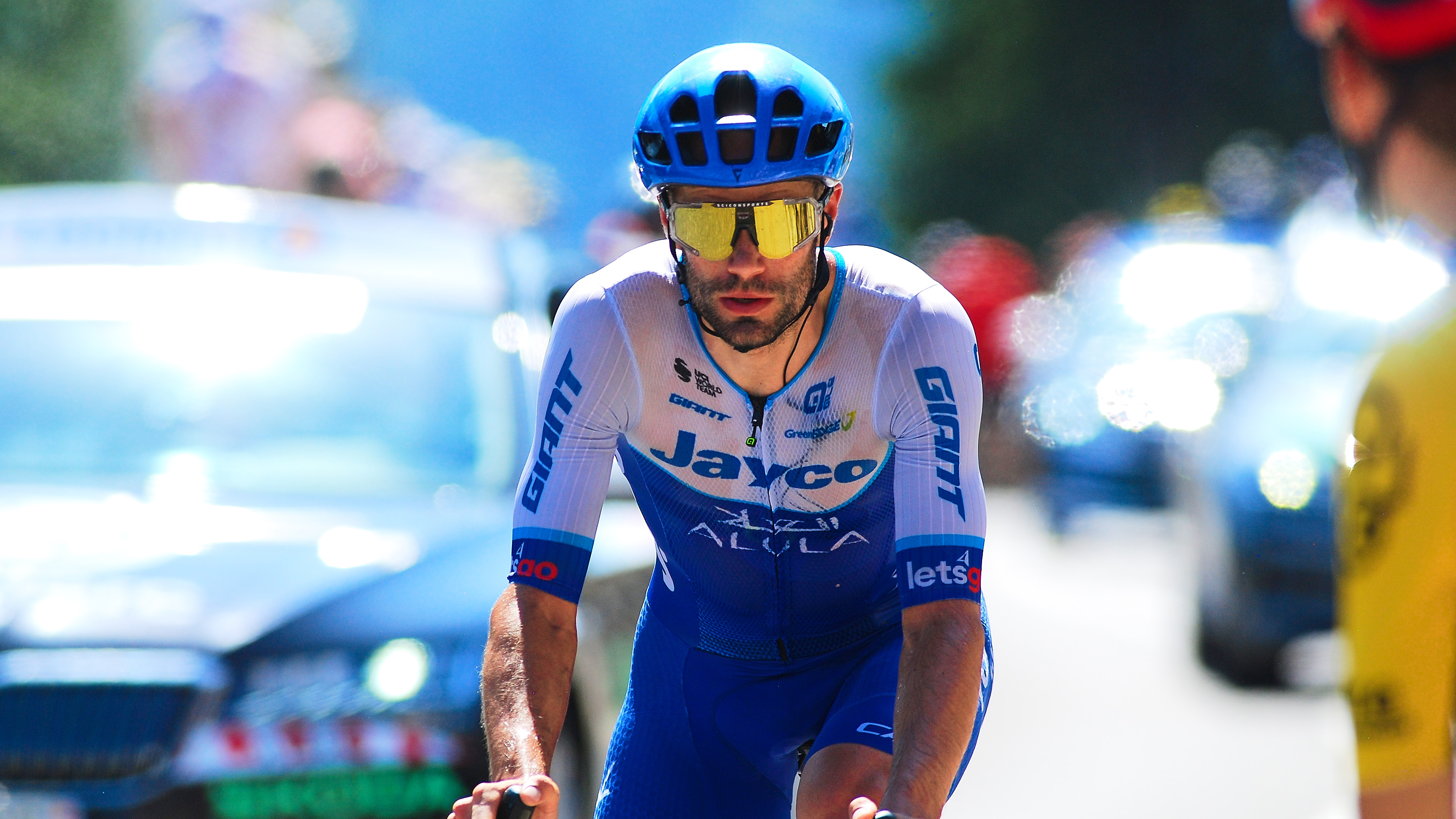
Strange but true: for all he remains one of cycling's top lead-out men – something from which fast finishers of the calibre of Caleb Ewan, Dylan Groenewegen, Marcel Kittel and John Degenkolb have all benefited to date – one of Luka Mezgec's most memorable days of his career so far was not in a bunch sprint, but when he was in a 'peloton' of just two riders: himself and Tadej Pogačar.
This happened in last year’s Slovenian National Championships, when Mezgec and Pogačar spent nearly four hours fending off the pack in a two-up breakaway. And if the duo's final positions on the podium were all but set in stone from the moment Pogačar bridged across to Mezgec in the opening moments of the race, Mezgec tells Cyclingnews that the experience of a day off the front with the number one-ranked rider in the world on their home roads still made it all worthwhile.
Special as it was, that's not to question Mezgec's enthusiasm for his usual 'day job' of lead-out man.

Back in 2021, when his current team, Jayco-AIUIa, signed Michael Matthews, he was quoted as saying, "to be there making quick decisions on the road with a sprinter attached on your wheel is one of the greatest feelings I've ever had in cycling".
Three years on, when it comes to making a verdict on whether that statement still holds true, he doesn't hesitate at all before answering: "Yes. 100%"
"It's a great feeling, and it's also a big responsibility. That's especially true at big events like the Tour de France where every move you do is really closely observed, and every mistake you make has a huge impact. Not just on the sprinter, but everywhere. The news is so much bigger," he explains.
Mezgec will have twice the usual opportunities this year to shine in Grand Tours, as becomes clear when asked what his first thoughts were when he heard that Ewan had re-signed for Jayco-AIUIa.
"Double shift," he said with a grin in an interview earlier this year. "I was expecting to get a double program and I wasn't wrong so much, because the first idea is that I ride the Tour and Vuelta, each sprinter [Groenewegen and Ewan] doing one Grand Tour.
"But I like it. I have raced with Caleb before, I had some great success with him in 2017" [four stages of the Tour Down Under and a stage of the Giro d'Italia amongst them -Ed.] "And again in 2018.
"I'm looking forward to getting him back on my wheel when that finally happens – because we have some great young riders developing really quickly in the team, too. But I'm happy to use my experience, too, to help bring another lead-out guy on for the team."
As a senior racer and part of the Jayco setup since 2016, it's only logical that Mezgec plays a significant role in the process of bringing forward new talent and honing more familiar faces into shape for the sprint train. But it's a role he enjoys, too.
"One idea is that [new signing] Max Walscheid works more with Caleb, while our train with Dylan [Groenewegen] will remain the same as last year," he explains.
"With the young guys, sometimes it's a challenge to explain everything, and also, you have to analyse everything when things go right. So when it works, it's great to be able to say 'well done, that was so good'."
He cites the case of a more senior rider in the sprint teams who stepped up early in the season when Groenewegen won the Clasica Comunitat Valenciana.
"Our position four man" – the fourth last in the line – "Elmar Reinders did really well, he's normally ahead of me on position three, but now he was position four because of Michael Matthews being there, too.
"So after one year of, let's say, educating when you see big progress like that, it's really good to see."
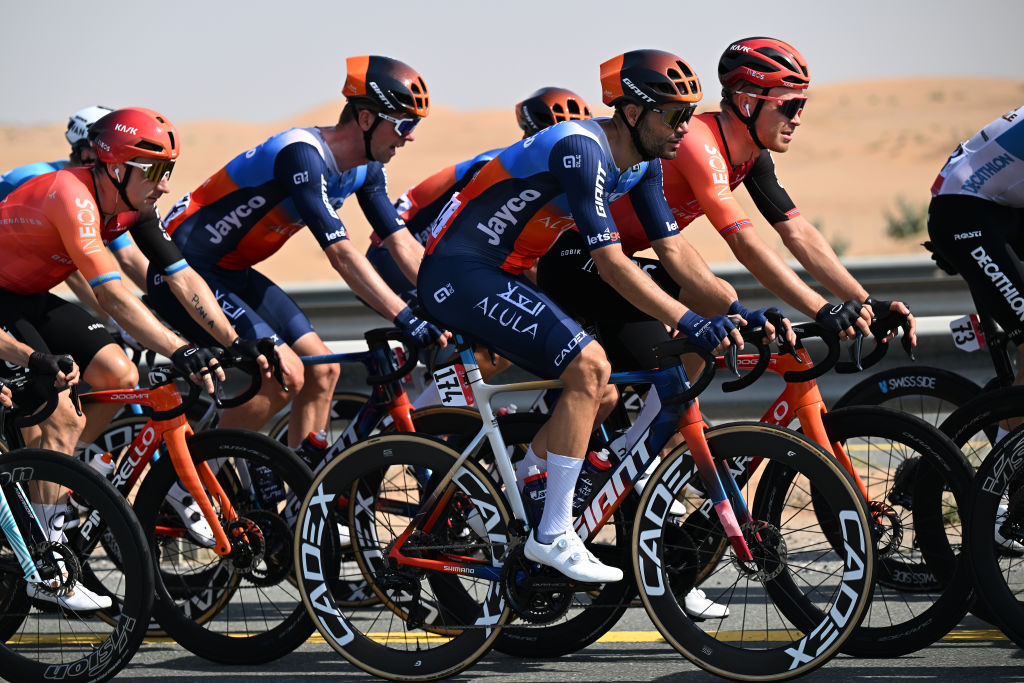
Why "Position Three" Matters So Much
The last links of the chain of riders for a sprinter are the most critical, but curiously, Mezgec argues that rather than the lead-out man, often it's the second-to-last rider – position 3, to use his expression – who can make all the difference.
"Sometimes, it's the harder job to do because between kilometre 1.5 and 500 metres to go, it's normally more of a mess, more chaotic, and there are more times when you really need to know what you have to do," he explains.
"At 500 metres to go, normally there's just one line to take and there's space, but at 1.5k's to go, there's still a lot going on, so you need to move correctly and make space for the second guy.
"If the third guy does a good job, the second guy doesn't have nearly as much to do."
Mezgec actually began top-level racing as a "position three" man when he started being part of the lead-out train for Marcel Kittel and John Degenkolb in his first WorldTour team, Argos Shimano, in 2013. And given the "position three" job requires a lot of experience and can decide so much, he says, it's a job that he's keen to have again further down the line when, inevitably, the time comes that his top speed begins to drop.
"As a lead-out man you always teach position three, too. I am always shouting where, when and all this, and actually a lot of times I'm thinking I want to move to that position because then the lead-out man would have an easier job. Once I'm there I know exactly what position two needs and what the sprinter needs.
"Lots of times, I'm not getting desperate, but how do you say, I have an idea where I want to be. But the guy in front, a lot of times, let's say, they do their own thing, and it's not what you expect. So I'm looking forward to moving to that position once it finally happens."
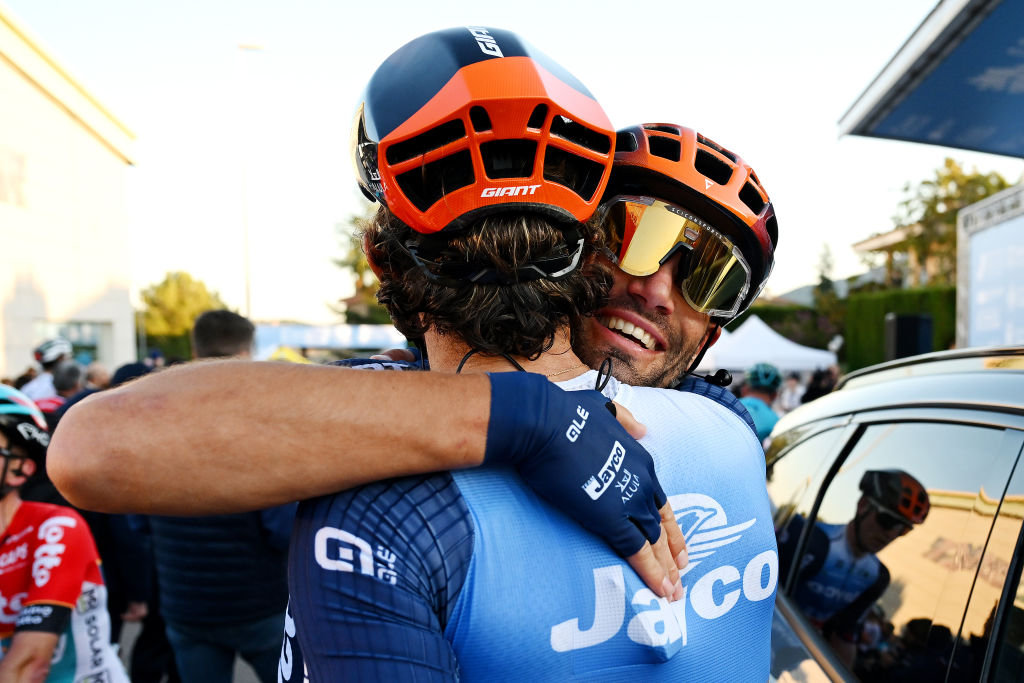
A few more percentage points
If an effective relationship between the third and second-last links in the sprint train is crucial, the one between the lead-out man and the sprinter can hardly be less important. And Mezgec concurs completely with another top lead-out man, Michael Mørkøv, who often says the one vital ingredient between the two is trust.
"100%. A lot of times when I was working with Caleb back in the day, in his first years as a pro, he was always finding his way. So your job as a lead-out man is then quite useless because you're doing your time but a lot of the time you're alone.
"But once you've got it [trust], it's really important. I got that with Caleb, and I get that with Dylan. A lot of the time, I'm doing, let's say, silly moves, but he's just following me glued to my wheel. And then when you see this, it's not just 100% good; it's also 100% more pressure.
"Because now I know if I fuck up, then I really fuck up, because the guy is with me, he trusts me, he knows how I bring him there. It's on me."
Mezgec, for one, says he thrives under the extra responsibility that brings.
"Without trust, there is no lead-out man. You're always alone, and the sprinter is always alone. It doesn't work," he says bluntly.
"So it's great to get this trust, but then you also need to live it as well. Because maybe if you fuck up, it's worse, but if you like pressure… I always like the pressure, and I know that once I'm under pressure, I can get a few more percentage points [in my performance]."
For all that, lead-out men are perhaps the most clearly defined group of team workers in the peloton, unlike team captains, say, who are constantly in communication with their rival counterparts during a race, Mezgec says that even in quieter moments, they don't tend to talk much to each other.
"There is a lot of mutual respect, though," he qualifies. "When it's a very messy final, we always give each other space because we know, OK, I give you space and your sprinter, but I expect the same for me."
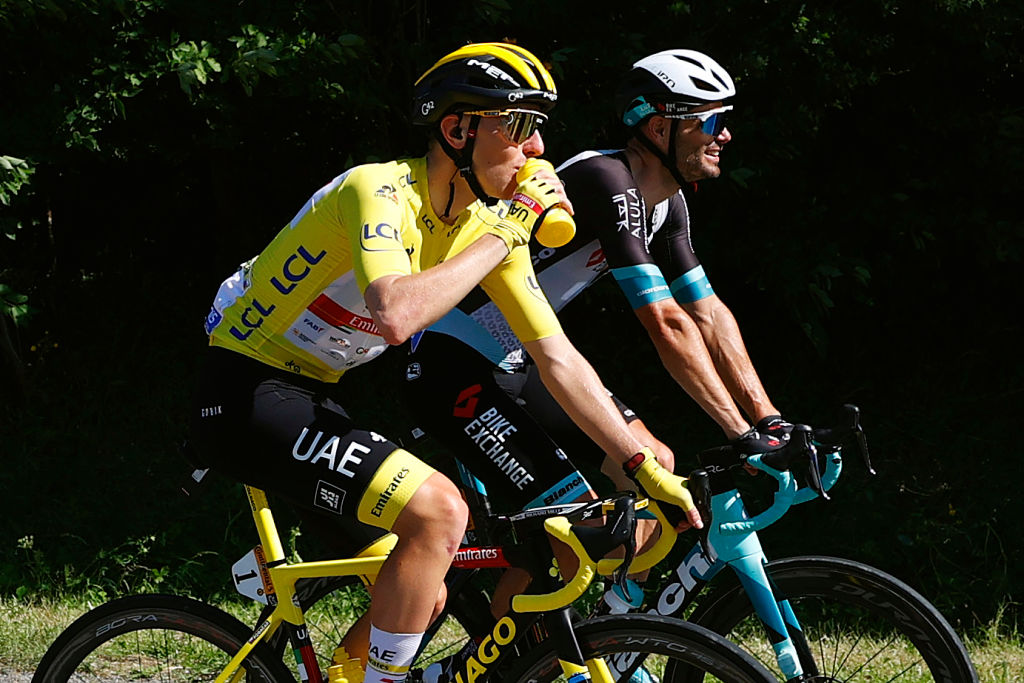

Riding with Pogačar
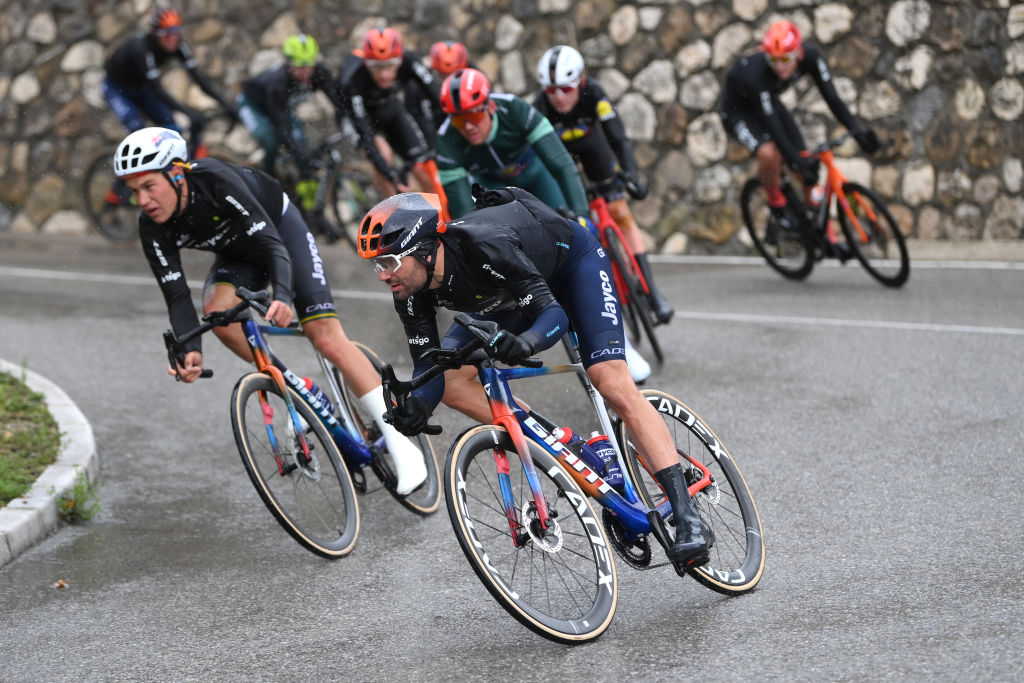
One of cycling's most time-honoured cliches is that it's a team sport where an individual wins and one of the great ironies of any team worker's existence is that if they do their job well and it ends in triumph, the full focus of the media is on the first rider across the line, not them. But where Mezgec found himself in the spotlight last June during that daylong attack with Pogacar at the Slovenian Nationals.
Mezgec recognised he was on a losing wicket, given his breakaway companion. "I'm a realist; I don't live in illusions," he says with a laugh. But as he saw it, just being there with Pogačar was something very special anyway.
"It was hard. It's not my usual job to be up there, but I was on the attack at kilometre 10 in a 160-kilometre-long race, then after 15 kilometres, just Pogačar came across. We knew [Matej] Mohoric was chasing, and if he got there, then it'd all come back, so I burned one match there already. I was committed, I said 'Let's go solo the whole race'.
"It was not easy to follow Tadej. He was in perfect shape for the Tour, but like I say, it's not my kind of effort to be 140ks swapping off. But we had a mutual agreement to go slow on the climbs so I could help on the flat, and it worked out perfectly.
"I knew I'd be short in the final because I'm OK if I'm in the bunch on a course like that because you make much less effort than if you have to pull in the wind. But I knew I'd struggle also with cramps because," he smiles, "my average power that year was probably the highest of the year."
Even though Pogačar's presence meant he would be in line for silver at best, as he recognises, there are not many riders who have had the chance to ride alongside one of the greats of the sport in such a long break.
"I'll definitely appreciate it more than when time has passed than at that moment, so that's good, and I've known Tadej for quite some time, so we knew exactly how to work together. We got lots of pictures taken of us together that day, being all that time together. It's going to be a nice part of the photo album."
Mezgec is 35 now and has a career going back to when he was in the 2010 lineup for the Continental Zheroquadro Radenska squad – curiously enough, the only teammate from that year still racing now is recent Het Nieuwsblad winner Jan Tratnik (Jumbo-Visma). So you might be forgiven for wondering if images like Mezgec and Pogačar together in the break are going to be some of the last in his collection as a pro. But Mezgec is adamant that's not the case.
"At the moment, I'm just thinking about first, let's do one more year 100%, let's do two more years 100%, and my finish line for when I'm 38," he says.
"But each year, I plan for two more years, and maybe in my last year, I'll really put myself in third position on that line [leadout train] to help grow new riders.
"My plan is actually to go on for as long as I don't see that I'm slowing down. To be honest, I'm still improving when it comes to peak power or reading the bunch. So if I'm in the Tour and I have the right feelings like now, then I'm going to continue."






